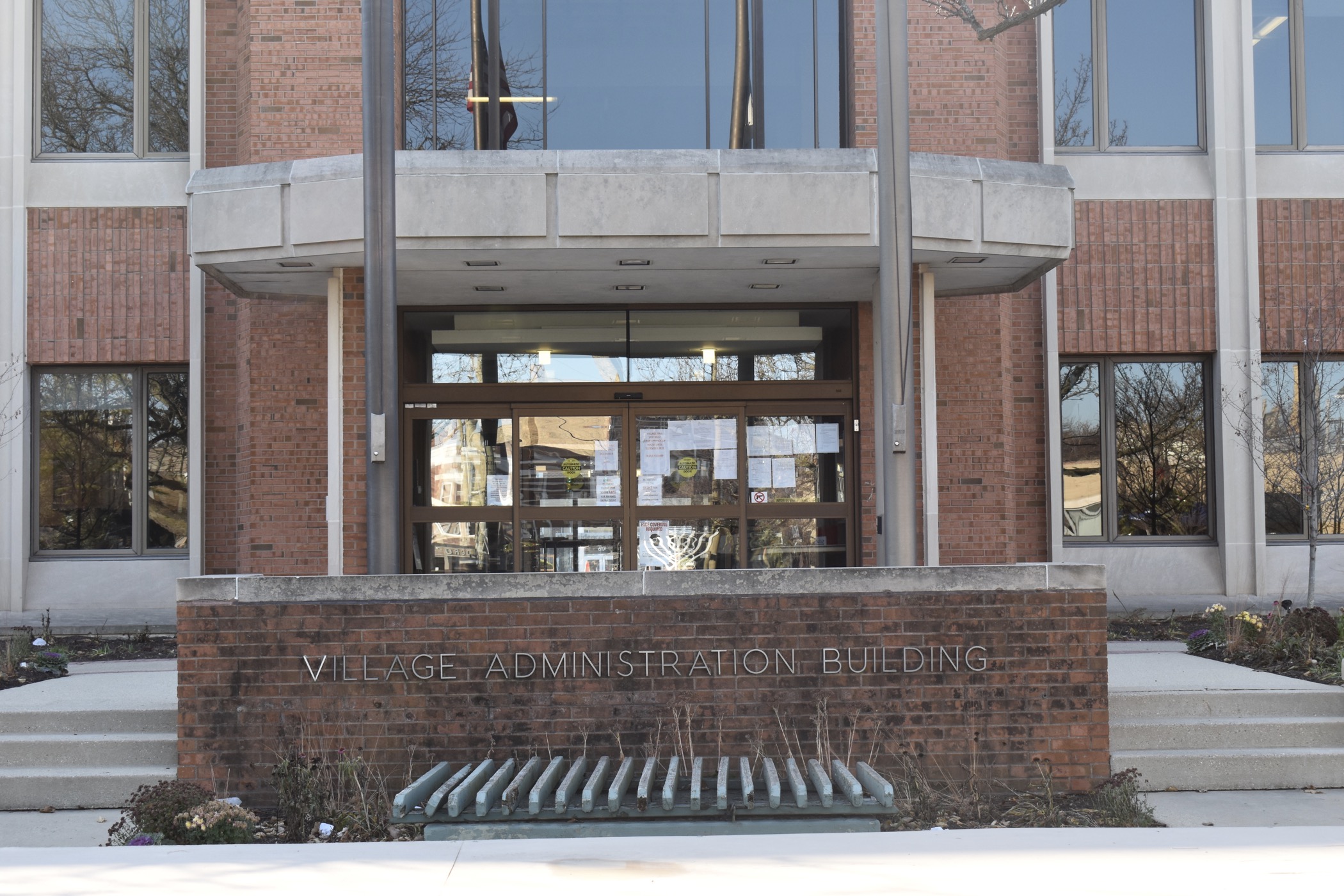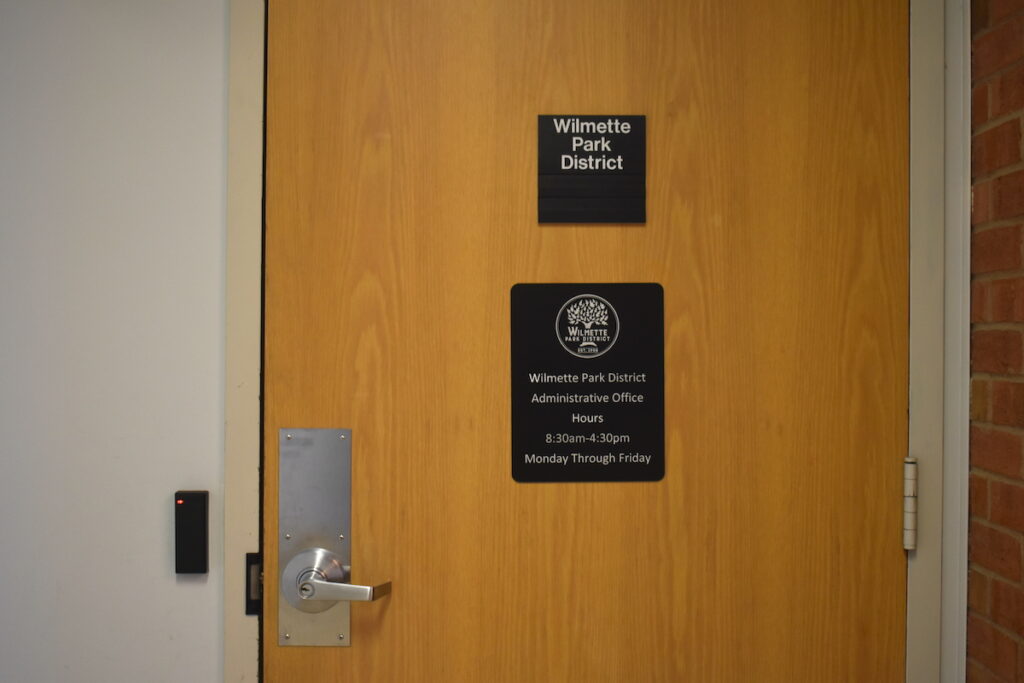
Senior couple’s addition request denied as policy language splits Wilmette Village Board
With two significant residential expansion applications on the agenda Tuesday, Aug. 24, the Wilmette Village Board had all hands on deck to work through variables of two unique cases — one of which was denied, while the other was tabled.
The first proposal, from Robert and Janice Geisheker of 4085 Bunker Lane, sought to add a 235-square-foot, one-level addition, causing the need for a 164-square-foot, or 1.77 percent, variation to the zoning ordinance.
Robert Geisheker disclosed to the board that his health condition has made it increasingly difficult to use the stairs, and the addition would allow him to avoid going upstairs to sleep.
“My knees aren’t getting any better,” he said.
Village officials inquired about the potential installation of a chairlift, but the owners and their architect explained that because the stairs are only 3 feet wide a chairlift would take up the space of the stairwell.
Another alternative raised was converting an existing first-floor room into a bedroom.
“The dining room is used,” Janice Geisheker said. “Our kids come over about once a week with the grandkids. That’s where we sit and have dinner, and we can’t all fit in the breakfast room.”
Some village trustees expressed that their hands were tied because of the language and interpretation of the village ordinance on “hardship.”
The Geishekers, who are in their 70s, expressed that they have a health-related hardship that is forcing them to change their home that they’ve lived in for 26 years.
But village officials argued the ordinance pertains to property-specific hardship rather than personal.
“Is it appropriate for us to make ad-hoc decisions that are different every time and are somewhat arbitrary? Or is it better that we have standards when talking about what a ‘hardship’ is so that people know what our ordinances mean to us?” Trustee Kathy Dodd asked.
A discussion on property quickly pivoted to a debate on the ever-present gray area of government policy.
“I don’t think we can ignore the needs of our residences now,” Plunkett said. “This is a small request, and in the past we have granted small requests for good reasons, and that’s why they have the variance process, and I know you’re looking for a hardship on the house itself [but] I think it’s really hard to tell our residents that we won’t look at the whole situation.
“They are asking for a reasonable accommodation to stay in the home that they’ve been in forever.”
Despite Plunkett’s plea, the board voted 4 to 3 to deny the Geishekers’ request with Kate Gjaja, Gina Kennedy, Daniel Sullivan and Dod voting against.
Plunkett, Peter Barrow and Justin Sheperd were in favor of the proposal.
“Wilmette needs to — and hopefully will do this in the comprehensive plan — come up with some plan or flexibility to provide for first-floor living,” Trustee Daniel Sullivan said.
Board pushes neighbors to work it out before tabling a second addition discussion
The Village Board decided to table a second complicated zoning request, one that was not recommended by the Zoning Board of Appeals.
The owners of 219 Central Avenue, Jim and Kimberly Van Nortwick, are proposing a two-story addition consisting of a third garage bay and second-story master bedroom. The Van Nortwicks contend their house is awkwardly laid out and the two-car garage “is not a usable space,” according to village documents.
The Zoning Board provided a negative recommendation, siding with a neighbor that “there is no difficulty or hardship preventing the owners from making reasonable use of the property” and the owners can “modify the interior of the existing home to find the space they need.”
The addition covers 738 square feet, pushing the home to 3,739 square feet of lot coverage and 8,378 square feet of floor area. Both coverages surpass the village-ordinance limits, and the addition requires zoning variations of 156 square feet (+0.8%) of lot space and 2,449 square feet (+14.3%) of floor space.
The Van Nortwicks argued that there are features of the house that are counted as livable space when really those spaces, such as a garage and basement, are not and cannot be used for living.
“The amount of square footage we want to add on is really the square footage that is not inhabitable,” Jim Van Nortwick said. “The idea was to try and limit the problems we had with it and still maintain the architectural design and design flow.”
A child also lives in the space and a senior citizen may soon move in, according to Jim , who told the Zoning Board that the addition would make the living spaces more convenient for all.
A neighbor, Shera Wiegler, who lives on the same block, objected to the addition, as she wrote in a letter to the Zoning Board that she does not believe a hardship exists and the family can “try to work within the existing structure,” the documents read.
“We built our home around this view of the Baha’i Temple, and we did so within the limits of the zoning ordinance,” Wiegler said. “We relied on this ordinance and we specifically designed our home so we could have a view of the Baha’i Temple from several areas of our home. While I’m sympathetic to certain things that the homeowners have stated, I just feel it’s setting a dangerous precedent, and it’s a really big ask.”
Village officials pointed out that “view” was not a sufficient argument as it could be obstructed through a number of unanticipated ways and that the owners of the home in question and the neighbors should go back to the drawing board before a vote.
“I’d like to see the homeowners and their neighbor sit down and talk like neighbors should about finding a solution to this and perhaps both can agree upon,” Trustee Peter Barrow said.
Because multiple new challenges on the issue were raised by both the homeowners, neighbors and village officials, the item was tabled until further notice.
Also worthy of note, the meeting kicked off with the introduction of Rahul Bhangare, who was recommended for appointment to the Plan Commission and Village President Senta Plunkett said she was “thrilled” to have on board.
The Record is a nonprofit, nonpartisan community newsroom that relies on reader support to fuel its independent local journalism.
Subscribe to The Record to fund responsible news coverage for your community.
Already a subscriber? You can make a tax-deductible donation at any time.

Alayne Trinko
Alayne Trinko is an editorial intern who assists the editor-in-chief in reporting hyperlocal news, developing engaging multimedia, and building community trust. Alayne was a staff writer and Focus section editor for The DePaulia, DePaul University’s student-run newspaper. Alayne will be a junior studying journalism this fall and hopes to study abroad to conduct social justice reporting on women’s reproductive health issues in Africa or India in summer 2022. Follow her on Twitter @AlayneTrinko.


